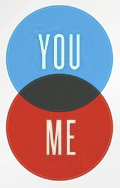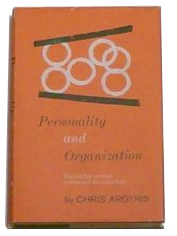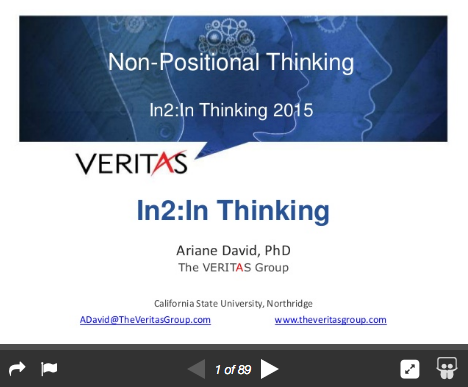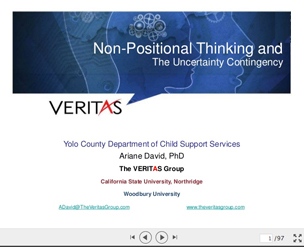Thinking About Thinking: Health Care
 Recently I had the opportunity to participate in a focus group being held to test public acceptance of a proposed initiative for the California ballot. We weren’t told specifically what was being tested or what position the initiative would take, just that it had to do with health care reform and what part government should play. The facilitator was skilled at building a discussion without forwarding any particular point of view, so the conversation was lively and relatively unguarded.
Recently I had the opportunity to participate in a focus group being held to test public acceptance of a proposed initiative for the California ballot. We weren’t told specifically what was being tested or what position the initiative would take, just that it had to do with health care reform and what part government should play. The facilitator was skilled at building a discussion without forwarding any particular point of view, so the conversation was lively and relatively unguarded.
As the conversation went from a general what’s-on-your-mind these days to health care, the participants began to tell their own health care stories. The surgeon’s wife told of how her husband retired because the pittance the health insurance companies paid him was barely enough to keep his office door open. The man whose wife had chronic serious health issues told of battling equally horrible insurance company red tape. For the nurse, hospital waste and duplication were destroying the system, and for the retired man Medicare paid too much for him to die but not enough for him to live. And so it went, the problem taking the shape of the needs and experiences of each person.
“…Or Not”
The facilitator asked whether or not the government should regulate health care, and whether or not there should be a public or a single payer option. What was most interesting to me about these questions was the “or not”. “Or not” is a phrase that is loaded with assumptions. It is a marker for the assumption that there are two contradictory possibilities of which only one is “right”. Inherent in “or not” statements is the assumption that in a complex issue such as health care there can be one right answer to the exclusion of all others.
Stuck Between Equal Piles of Hay
Finally, we were asked whether “or not” we agreed with each of the statements in the proposed initiative. I abstained. Like Buridan’s donkey stuck between equal piles of hay, I found the pros and the cons of each statement to be equally unsuitable. A problem as complex and ideologically divisive as health care, that has defied solution for as long as it has existed cannot be solved by passing another reform. I mentioned my concern. Someone suggested that maybe what was needed was compromise or a solution somewhere in the middle. Meeting in the middle doesn’t work either: while it’s in the middle it’s still positional thinking. I kept quiet.
Thinking in the Middle
 Positional thinking means that our thinking on a subject, say health care reform, is rooted in a particular point of view to the exclusion of all others. Herein lies the problem. It tells us nothing about the workability of our position, or the realities of the world outside our view. When we are thinking positionally, even if we examine other points of views or options, we examine them from the assumption the our position is right. When we gather information, we do so selectively, favoring information that confirms our position, while excluding disconfirming information. While we say that we have been objective in our examination of other possibilities and have rationally chosen our position, in reality our choice is the consequence of engrained habits of thinking based in our unique assumptions, needs, and feelings, making effective decision making impossible. People in the middle are just as stuck in their middleness as people at the extremes are stuck in their extremes. Being in the middle is just another position.
Positional thinking means that our thinking on a subject, say health care reform, is rooted in a particular point of view to the exclusion of all others. Herein lies the problem. It tells us nothing about the workability of our position, or the realities of the world outside our view. When we are thinking positionally, even if we examine other points of views or options, we examine them from the assumption the our position is right. When we gather information, we do so selectively, favoring information that confirms our position, while excluding disconfirming information. While we say that we have been objective in our examination of other possibilities and have rationally chosen our position, in reality our choice is the consequence of engrained habits of thinking based in our unique assumptions, needs, and feelings, making effective decision making impossible. People in the middle are just as stuck in their middleness as people at the extremes are stuck in their extremes. Being in the middle is just another position.
Compromise is a cousin of thinking in the middle. It is still grounded in the belief that our position is the only right one. However, in order to reach an agreement, we are willing to sacrifice a less important piece of our position and trade it for a piece of the other’s position that they are willing to sacrifice. Nowhere in compromise is there the open-minded non-positional examination of other points of view. In the end all we have are sacrifices patched together, where each party has given up something right for something wrong in order to cobble together an agreement made of patches. All parties feel cheated and all await the next encounter in order to regain they have lost.
What Would Einstein Do?
 Back in the health care focus group I found myself channeling Einstein, you cannot solve a problem with the same thinking that created it. Nowhere in the discussion was there the possibility for a kind of thinking that went beyond the ruts of the thinking that brought us to this seemingly impassable point. What no one in the room was talking about, no one in the healthcare debate, as far as I could see, was that the issue is not health care but how we think about health care.
Back in the health care focus group I found myself channeling Einstein, you cannot solve a problem with the same thinking that created it. Nowhere in the discussion was there the possibility for a kind of thinking that went beyond the ruts of the thinking that brought us to this seemingly impassable point. What no one in the room was talking about, no one in the healthcare debate, as far as I could see, was that the issue is not health care but how we think about health care.
It All Comes Back to Thinking
 In the 1960s Chris Argyris proposed that all complex problems are problems of thinking: how we think about a problem IS the problem. Thus, problems are never what they seem to be. We look at them and see the obvious, the symptoms, not what lies beneath. He suggested that solutions that purport to solve the problem without examining the thinking behind it can never be complete or lasting. The problem will always resurface, sometimes in the same form, sometimes in an altered form, but resurface it will until we address the structure that is keeping the problem in place. This can only be done with non-positional thinking.
In the 1960s Chris Argyris proposed that all complex problems are problems of thinking: how we think about a problem IS the problem. Thus, problems are never what they seem to be. We look at them and see the obvious, the symptoms, not what lies beneath. He suggested that solutions that purport to solve the problem without examining the thinking behind it can never be complete or lasting. The problem will always resurface, sometimes in the same form, sometimes in an altered form, but resurface it will until we address the structure that is keeping the problem in place. This can only be done with non-positional thinking.
Non-positional thinking requires that we lift ourselves above the lineup of positions and adopt the greatest possible perspective. From this vantage we can see that all positions, no matter how extreme or centrist, including our own, are deeply established mind-sets that must be examined and understood, both for the short and the long term. Ultimately we have to ask the life changing question, “What is it that I am NOT seeing, which if I saw would transform how I think about this issue or even about life itself?”
The focus group was a metaphor for the health care debate in general, where old thinking and old solutions are continuously resurfaced, recycled, traded and patched together in the name of reform. Health care reform is like a pair of pants that have been patched so often that nothing remains of the original cloth, just sacrificial patches hanging on sacrificial patches all cobbled together with a thread, and the thread is unraveling.
If you have any questions about Thinking About Thinking please send me a note from our contact page or email me at ADavid[at]theveritasgroup.com.



[…] defined by expert Ariane David of the Veritas Group, “Positional thinking means that our thinking on a subject is rooted in a particular point of […]
[…] http://theveritasgroup.com/2011/10/20/thinking-about-thinking-health-care/ […]
Though I participate in the In2In Thinking, your session falls when I will be training to Boston.
So, in reading your article, might Einstein have been in error about the focus, the scaling that occurs in a mind as it zooms in and out? For trace elements of former knowledge are put into the crucible, while one searches for new insights as to first how one has 2 hay bales and then why? When one has a field that might be scorched because of climate change?
In healthcare, what has not surfaced is the nature of how a number of people have been “treated” and dismissed. So, how does one frame or work with organizations versus a city, a county, a region, a state or a nation? Better yet, a cosmos? Though I will not be able to be in-line, perhaps there will be a memory and later a recording of the session? Best to you in the presentation!
Bill